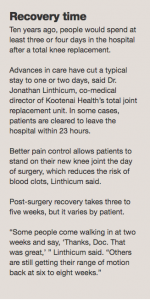It Wasn’t A Good Idea 20 Years Ago and It Still Isn’t







Let’s face it; you are being lied to by the medical establishment.
Recently a Spokane Newspaper ran a story about a 40-year-old mother who received bilateral knee replacements in glowing terms. There are two major errors being promoted in this article so let me take a few seconds of your time to correct these mischaracterizations.
Lie Number One
It’s really common now for younger people to get knee replacements so it’s no big deal
“Twenty years ago, the median age in the class was over 80,” said Payne, a registered nurse. “If you were 50, they wouldn’t even look at you. Now, it’s not uncommon to see younger people in the class,” she said.
 While it might be more common now, it is still very unwise. From the article you can learn that people younger than 65 represent the fastest growing group of patients and that this increase is not because that demographic is being targeted with marketing.
While it might be more common now, it is still very unwise. From the article you can learn that people younger than 65 represent the fastest growing group of patients and that this increase is not because that demographic is being targeted with marketing.
You are told that the majority of these patients have had previous athletic injuries and that some have had previous surgeries. Having arthroscopic surgery has been linked with an increased likelihood of eventually having knee replacement surgery, which should tell you something about the wisdom of seekng surgical interventions to your knee problem in the first place.
The story’s surgical hero shopped around until she found a someone who would perform the surgery on a 40 year old, so we know that there are still other surgeons with common sense who will not perform the surgery for those under 50. The other surgical hero had her replacement at 45 after being finally convinced by her husband to go ahead with the procedure.
Under the headline, ‘It was definitely worth it’ we read that “the life expectancy of artificial knees has increased”, and that our surgical superhero expects to get at least 20 years from her new knees.
According to the American Association of Hip and Knee Surgeons, “Most current data suggests that both hip and knee replacements have an annual failure rate between 0.5-1.0%. This means that if you have your total joint replaced today, you have a 90-95% chance that your joint will last 10 years, and a 80-85% that it will last 20 years.
That sounds great right? However that data has been compiled on a population of 60-80 year olds who are much more sedentary than the young surgical candidates being discussed in the article.
Lie Number Two
The rehabilitation is no big deal.
From the article’s sidebar more cheerleading can be found: “Ten years ago, people would spend at least three or four days in the hospital after a total knee replacement.
Advance s in care have cut a typical stay to one or two days, [mostly because of cost saving measures for the insurances/hospital not because it’s the best thing for the patient] said Dr. Jonathan Linthicum, co-medical director of Kootenal Health’s total joint replacement unit. In some cases, patients are cleared to leave the hospital within 23 hours. [This isn’t the hard part because early pain relief is generally quite good. It’s switching over to oral formulations that can be difficult.]
s in care have cut a typical stay to one or two days, [mostly because of cost saving measures for the insurances/hospital not because it’s the best thing for the patient] said Dr. Jonathan Linthicum, co-medical director of Kootenal Health’s total joint replacement unit. In some cases, patients are cleared to leave the hospital within 23 hours. [This isn’t the hard part because early pain relief is generally quite good. It’s switching over to oral formulations that can be difficult.]
Better pain control [There is no magic bullet pain control method and most being used have been around for a while] allows patients to stand on their new knee joint the day of surgery, which reduces the risk of blood clots, Linthicum said. [We have been standing patients the day of surgery to prevent blood clots for a long time.]
Post- surgery recovery takes three to five weeks, but it varies by patient. [This is a very rose colored view and in fact our surgical hero had her second knee replacement surgery March 1 and according to the article is still ” moving carefully” about 9 weeks later.]
“Some people come walking in at two weeks and say, ‘Thanks Doc. That was great, ‘Linthicum said. “Others are still getting their range of motion back at six to eight weeks.”
Don’t be fooled, this puff piece could have been written by the marketing department of the hospital and would be more appropriate on the hospital’s website than a newspaper. There is no critical reporting at all.
If you or someone you know has been told that you are a candidate for knee surgery, don’t just blindly trust they have your best interests at heart.
Consider the following scenarios:
You have the replacement at 40 years old and need to have a revision within 5 years because of an implant failure. At 50 you need a third surgery because your activity levels were much higher than a 70 year old. Will you be a candidate for a 4th surgery at 70 and how well would it take? Will you have any bone left?
Knee replacement surgeries soar to over 3 million a year in 2030 as projected but the government no longer has the money to perform them at that volume and so you are required to fork out a 50% co-pay for your revision or even worse are denied surgery.










